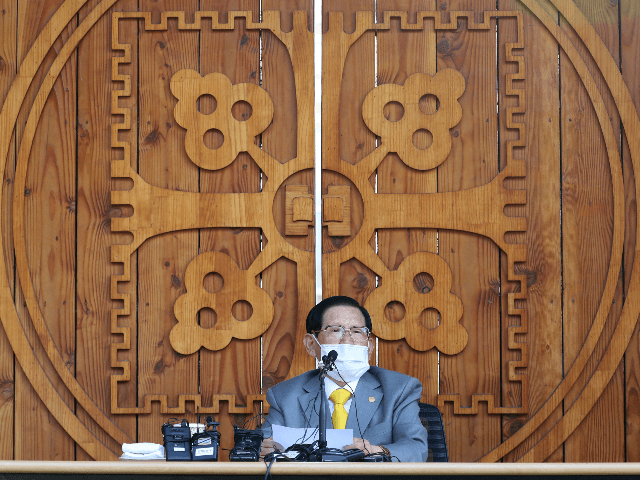Some South Korean officials on Monday asked for murder charges to be brought against Lee Man-hee, founder and leader of a religious sect called the Shincheonji Church, and 11 of his top followers because they spread the Wuhan coronavirus across the country and interfered with efforts to track infected persons.
The government believes up to 60 percent of South Korea’s 4,335 coronavirus cases can be traced to the Shincheonji Church.
The church, which has been denounced as a cult with apocalyptic beliefs revolving around Lee as a messiah who will take them to paradise on Judgment Day, has about 230,000 members. Almost 9,000 of them are currently exhibiting symptoms of the coronavirus.
The infection appears to have been spread by an elderly member who visited the Chinese city of Wuhan, refused to be hospitalized when she became ill, and contaminated fellow worshipers at four church meetings, including one in Daegu, South Korea’s fourth-largest city. Church members then began spreading the disease through the South Korean population. Shincheonji worship services are notoriously overcrowded.
The South Korean government charged Shincheonji leaders with being slow to cooperate with health officials. Their secretive conduct has been cited as a violation of the National Infectious Disease and Control Act, and since the coronavirus has killed at least 26 South Koreans so far, the government wants them investigated for murder.
“The situation is this serious and urgent, but where are the leaders of the Shincheonji, including Lee Man-hee, the chief director of this crisis?” asked Park Won-soon, the mayor of Seoul. Park charged that many of South Korea’s coronavirus fatalities could have been avoided if Lee and his followers had been more cooperative.
88-year-old Lee offered a public apology from behind a medical face mask during a press conference on Monday as reported by Voice of America News (VOA), although he did not admit to any wrongdoing:
“I would like to offer my sincere apology to the people on behalf of the members,” said Shincheonji head Lee Man-hee, his voice breaking.
The 88-year-old twice got down on his knees to bow before reporters in Gapyeong, his head to the floor.
“Although it was not intentional, many people have been infected,” he said. “We put our utmost efforts but were unable to prevent it all. I seek the forgiveness of the people.”
“I am very thankful to the government for its efforts. I also seek the forgiveness of the government,” Lee Man-hee continued.
Lee promised his group was now “actively cooperating with the government” and would “not spare human and material support” for the fight against the coronavirus. Protesters shouted insults at Lee during his press conference, while over a million South Koreans have signed a petition asking for the sect to be disbanded.
The New York Times noted that last week Lee sent a message to members of his church that depicted the coronavirus as a form of divine vengeance against “the evil who got jealous of Shincheonji’s rapid growth.”
As the Times described it, the sect has indeed grown quickly while deflecting criticism of its unusual practices as religious persecution:
Mr. Lee has long courted controversy. He has been dogged by lawsuits, protest rallies and allegations of preaching heresy, splitting apart families, as well as going after rival churches. He has survived them all, commanding a messianic charisma over the 245,000 followers who he says the church has in South Korea and abroad.
Until now, Mr. Lee’s Shincheonji has been one of the fastest-growing religious sects in South Korea. He has employed an aggressive proselytizing program that has unnerved mainstream Christian religions who liken the church to a cult. He has often staged large-scale outdoor events that remind critics of massive propaganda rallies in North Korea.
Like North Korea, the church has its own calendar, counting the years from the day Mr. Lee founded it in 1984. It hosts its own “Olympiad,” filling a stadium with worshipers from around the world. It features military-style honor guards, taekwondo exhibitions and other group performances similar to North Korea’s Mass Games. Often dressed in snow white and carrying his trademark hand-held folding fan, Mr. Lee likes to snap a military salute to his adoring crowds.
“Shincheonji has been growing rapidly despite the persecutions” from the mainstream Christian churches, Mr. Lee said in an interview with the newspaper Kyeonggi Ilbo last June. “Why? Because we have a doctrine. We are not a traditional church.”
As the coronavirus spread, health officials became so desperate to track down its secretive and potentially infectious members that they resorted to sending text messages to the public asking for their help. The sect denounced these efforts as a form of “witch-hunting” and said its members were reluctant to turn themselves in to the authorities because they feared persecution. At one government clinic in Daegu, an official became sick with the coronavirus and then revealed he had secretly been a member of Shincheonji all along.
The mayor of Daegu accused Shincheonji of submitting an inaccurate list of members to health officials, as did a civic group called the National Shincheonji Victims Coalition, whose ranks include many former members of the sect and their families. After these complaints were leveled, Shincheonji gave another 65,000 names of “trainees” to the government and said it misidentified some of its 40,000 members who live outside South Korea.

COMMENTS
Please let us know if you're having issues with commenting.